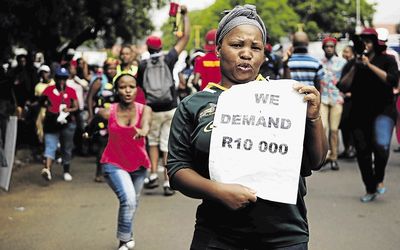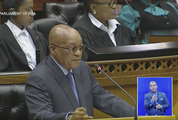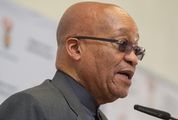THE success by university students and workers in obtaining concessions over outsourcing has led to comparisons with the perceived failure by the Congress of South African Trade Unions (Cosatu) in having labour broking outlawed.
The main union behind the fight against outsourcing by universities, the National Education, Health and Allied Workers Union (Nehawu), has acknowledged the role students played in gaining concessions during the protests that began last year.
University leaders also noted the protests had led to discussions over tertiary funding which they had been advocating for years, but unions are facing similar battles as those faced by student representative councils — a battle over credit and legitimacy.
Nehawu is also facing accusations by some protesters of failing to sufficiently include contracted staff, who are not represented in formal bargaining structures.
The union is outraged over perceptions it is asleep at the wheel.
Cosatu points to a 2012 African National Congress (ANC) resolution to deal with outsourcing by boosting the capacity of the state to deliver goods and services.
The federation’s battle against labour broking has received far more public focus than its opposition to outsourcing, although for some, both involve resisting a wave of neoliberalism that handed many services over to private contractors.
Nehawu is gearing up for mobilisation against casualisation, which encompasses labour broking, and outsourcing other temporary services. This is in line with Cosatu’s resolution last year to "redouble efforts" to end these labour practices.
University leaders and union officials have acknowledged student protests have given momentum to issues that date over a decade ago: the cost of tuition and the outsourcing of services. Nehawu, which agrees, however, puts this down to an alliance between labour and students that has built on the union’s groundwork.
Tshwane University of Technology is the third Pretoria-based university to agree to phasing out outsourced services, following the University of Pretoria (Tuks) and University of SA. Agreements to end outsourcing were first struck at the University of Cape Town (UCT) during student protests last year.
Cosatu and the National Union of Metalworkers of SA (Numsa) have indicated they are gearing up for new campaigns against outsourcing, and both want labour broking banned.
While outsourcing differs from labour broking, it is seen as part of the same battle, says Numsa president Andrew Chirwa. "It is through outsourcing that labour brokers come in and feed on those workers that are outsourced under the pretext of ‘core’ and ‘noncore’ business," he says.
The major difference between the outsourcing of services and labour broking is that in the former, the contracted companies own the equipment and manage the staff directly, offering economies of scale, which employers say offer savings in areas such as cleaning, landscaping, legal services and information technology.
Employees contracted from a labour broker may work alongside permanent staff, and under the same management. However, this could also come with lower pay, fewer benefits and less job security. While changes to labour laws have further restricted temporary employment — or labour broking — there have been no major changes to outsourcing. Section 197 of the Labour Relations Act, which ensures that businesses transferred as "a going concern" retain staff and conditions of service has consistently led to legal battles.
Talita Laubscher, a partner in employment practice at Bowman Gilfillan, says new developments in the courts centred on legal interpretations of what constitutes a transfer, a business or a going concern, with a major area being the transfer of assets. Criteria the courts have established for whether a business is transferred as a going concern entail " a snap shot of what the business or the service looked like before the transfer and what it looks like afterwards".
"But a transfer cannot be reduced to the activity that was performed. You look at all the assets involved," she says. Cosatu and affiliates have previously been angered by outsourcing in government departments, although some unions have scored legal victories in the private sector.
Nehawu maintains that outsourcing goes beyond conditions of service. The union says it has evidence that outsourcing is "a breeding ground for corruption", but is refraining from making it public to protect workers.
Last week, Nehawu hit out at suggestions it was "absent" in protests against outsourcing at the gates of Pretoria campuses — supported by the Economic Freedom Fighters and #Outsourcingmustfall movement.
The union says it spearheaded the agreement struck at UCT that, in many ways, served as a template for those struck at other institutions including education for dependants of staff, staff themselves and the rapid phasing out of contracts amid immediate salary increments.
Speaking after the conclusion of the agreement at Tuks, #Outsourcingmustfall spokesman Mametlwe Sebei and the Economic Freedom Fighters Student Command said employees were being excluded from talks.
Mr Sebei, also general secretary of the Workers and Socialist Party of SA (Wasp), said while many of the organisers of the movement came from Wasp, it was simply a case of genuine anger over economic inequalities, and failure of existing arrangements of collective bargaining.
"This outsourcing issue is just part of the molten lava of working-class anger that erupted in Marikana," he said. The movement is eyeing the government, particularly municipalities, where management and labour often collude at the expense of outsourced employees. In some cases, the unions were "even more rightwing than management", he said.
Labour analyst Tony Healy says giving students a say on staffing issues ultimately will mean input on a raft of issues, ranging from supply chain management to procurement.

WEAK: A contract worker at Tshwane University of Technology protests against outsourcing. Criticism is being levelled at the Congress of South African Trade Unions for its perceived failure in having labour broking outlawed. Picture: SOWETAN
THE success by university students and workers in obtaining concessions over outsourcing has led to comparisons with the perceived failure by the Congress of South African Trade Unions (Cosatu) in having labour broking outlawed.
The main union behind the fight against outsourcing by universities, the National Education, Health and Allied Workers Union (Nehawu), has acknowledged the role students played in gaining concessions during the protests that began last year.
University leaders also noted the protests had led to discussions over tertiary funding which they had been advocating for years, but unions are facing similar battles as those faced by student representative councils — a battle over credit and legitimacy.
Nehawu is also facing accusations by some protesters of failing to sufficiently include contracted staff, who are not represented in formal bargaining structures.
The union is outraged over perceptions it is asleep at the wheel.
Cosatu points to a 2012 African National Congress (ANC) resolution to deal with outsourcing by boosting the capacity of the state to deliver goods and services.
The federation’s battle against labour broking has received far more public focus than its opposition to outsourcing, although for some, both involve resisting a wave of neoliberalism that handed many services over to private contractors.
Nehawu is gearing up for mobilisation against casualisation, which encompasses labour broking, and outsourcing other temporary services. This is in line with Cosatu’s resolution last year to "redouble efforts" to end these labour practices.
University leaders and union officials have acknowledged student protests have given momentum to issues that date over a decade ago: the cost of tuition and the outsourcing of services. Nehawu, which agrees, however, puts this down to an alliance between labour and students that has built on the union’s groundwork.
Tshwane University of Technology is the third Pretoria-based university to agree to phasing out outsourced services, following the University of Pretoria (Tuks) and University of SA. Agreements to end outsourcing were first struck at the University of Cape Town (UCT) during student protests last year.
Cosatu and the National Union of Metalworkers of SA (Numsa) have indicated they are gearing up for new campaigns against outsourcing, and both want labour broking banned.
While outsourcing differs from labour broking, it is seen as part of the same battle, says Numsa president Andrew Chirwa. "It is through outsourcing that labour brokers come in and feed on those workers that are outsourced under the pretext of ‘core’ and ‘noncore’ business," he says.
The major difference between the outsourcing of services and labour broking is that in the former, the contracted companies own the equipment and manage the staff directly, offering economies of scale, which employers say offer savings in areas such as cleaning, landscaping, legal services and information technology.
Employees contracted from a labour broker may work alongside permanent staff, and under the same management. However, this could also come with lower pay, fewer benefits and less job security. While changes to labour laws have further restricted temporary employment — or labour broking — there have been no major changes to outsourcing. Section 197 of the Labour Relations Act, which ensures that businesses transferred as "a going concern" retain staff and conditions of service has consistently led to legal battles.
Talita Laubscher, a partner in employment practice at Bowman Gilfillan, says new developments in the courts centred on legal interpretations of what constitutes a transfer, a business or a going concern, with a major area being the transfer of assets. Criteria the courts have established for whether a business is transferred as a going concern entail " a snap shot of what the business or the service looked like before the transfer and what it looks like afterwards".
"But a transfer cannot be reduced to the activity that was performed. You look at all the assets involved," she says. Cosatu and affiliates have previously been angered by outsourcing in government departments, although some unions have scored legal victories in the private sector.
Nehawu maintains that outsourcing goes beyond conditions of service. The union says it has evidence that outsourcing is "a breeding ground for corruption", but is refraining from making it public to protect workers.
Last week, Nehawu hit out at suggestions it was "absent" in protests against outsourcing at the gates of Pretoria campuses — supported by the Economic Freedom Fighters and #Outsourcingmustfall movement.
The union says it spearheaded the agreement struck at UCT that, in many ways, served as a template for those struck at other institutions including education for dependants of staff, staff themselves and the rapid phasing out of contracts amid immediate salary increments.
Speaking after the conclusion of the agreement at Tuks, #Outsourcingmustfall spokesman Mametlwe Sebei and the Economic Freedom Fighters Student Command said employees were being excluded from talks.
Mr Sebei, also general secretary of the Workers and Socialist Party of SA (Wasp), said while many of the organisers of the movement came from Wasp, it was simply a case of genuine anger over economic inequalities, and failure of existing arrangements of collective bargaining.
"This outsourcing issue is just part of the molten lava of working-class anger that erupted in Marikana," he said. The movement is eyeing the government, particularly municipalities, where management and labour often collude at the expense of outsourced employees. In some cases, the unions were "even more rightwing than management", he said.
Labour analyst Tony Healy says giving students a say on staffing issues ultimately will mean input on a raft of issues, ranging from supply chain management to procurement.






















Change: 0.96%
Change: 0.73%
Change: 2.82%
Change: -0.03%
Change: 2.23%
Data supplied by Profile Data
Change: 0.42%
Change: 1.08%
Change: 0.96%
Change: 0.00%
Change: 0.81%
Data supplied by Profile Data
Change: -3.08%
Change: -1.53%
Change: -2.17%
Change: -1.95%
Change: -1.86%
Data supplied by Profile Data
Change: -0.03%
Change: 0.61%
Change: 2.24%
Change: 2.24%
Change: 2.66%
Data supplied by Profile Data